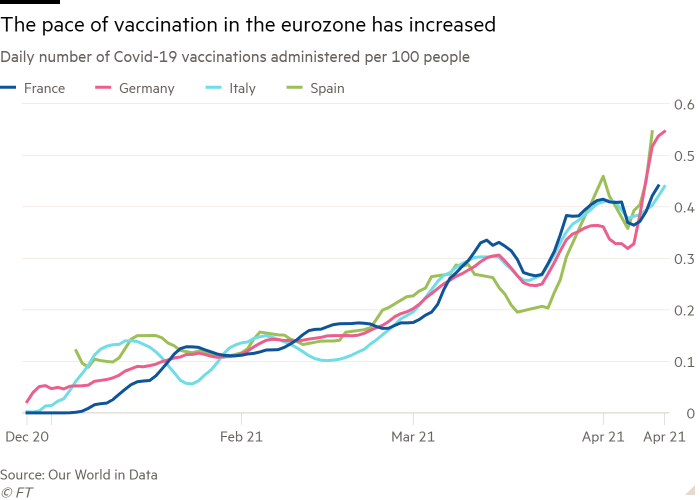[ad_1]
Budding optimism over Europe’s coronavirus recovery could spell trouble for the region’s government bonds as some investors move beyond peak pessimism on the continent’s economy.Â
After riding the choppy markets together through the first stage of the pandemic in 2020, European and US government bonds have parted ways this year.
US Treasuries suffered their worst sell-off in decades during the first quarter as investors prepared for an economic surge, while the blow to eurozone government bonds was much milder, because of vaccine delays, new social curbs and signals that the European Central Bank is prepared to act to fend off rising bond yields.
But now, some analysts say improving European economic data and the region’s accelerating vaccination programme will herald another shift higher in government bond yields, which set the baseline for borrowing costs, and boost the euro against the dollar.Â
“The big surprise in the first quarter was how quickly the US reopened,†said Jim Caron, portfolio manager at Morgan Stanley Investment Management. “Once that surprise is fully priced, the market starts to look for the next big surprise. It’s the virus that dictates where that surprise comes from. All you have to ask yourself is where the data is going to get better next. It’s pretty obvious that it’s in Europe.â€
The transatlantic gap in bond yields reached 2 percentage points in mid-March, the widest spread between US Treasuries and German Bunds since the pandemic forced the bonds together in February 2020.

In large part, the stability of eurozone government bonds came down to the response from the ECB. Fearful of the US bond decline leaking too far into European markets, pumping up borrowing costs at a delicate economic juncture, the ECB stepped up the pace of its bond-buying in March.Â
But in addition, Europe was slow off the mark with vaccinations. By mid-February, the US had delivered around 16 doses per 100 people, triple the proportion that had been provided to EU residents, according to figures from the Our World in Data project at the University of Oxford.
Now, Europe is picking up the pace. Germany set a record of 719,000 daily doses last week, and the bloc has now vaccinated 23 in every 100 people. Recent economic data have proven more robust.

“I would agree with the peak pessimism argumentâ€, said Ella Hoxha, a bond portfolio manager at Pictet Asset Management. “The general rollout of vaccinations in Europe is actually picking up and probably has not had enough air time.â€
Already, European government bonds are coming under some selling pressure as the German 10-year yield rose to its highest level since the end of February at minus 0.25 per cent. Italian bonds are also at their weakest in a month, hitting a high of almost 0.79 per cent on Thursday. The euro lost almost 4 per cent against the dollar in the first quarter, but has regained ground in April.

The case for a larger pick-up in the euro rests on the pace of vaccinations. Bank of America currency strategist Athanasios Vamvakidis said faster immunisations are already having an impact. For those gains to be sustained, he argues, “vaccination would have to accelerate fast enough to save at least part of the summer tourist season . . . This is feasible, but not a givenâ€.
Even in the best-case scenario for reopening, analysts do not expect a bond sell-off similar in scale to the flight from Treasuries earlier in the year. ECB bond buying continues to lean against rising yields, and inflation expectations in Europe are firmly anchored.Â
“European government bonds are likely to perform better. There is no realistic outcome for high inflation in Europe. It’s very, very difficult to imagine one,†said April LaRusse, head of investment specialists at Insight Investment.
The reopening could also set traps in the path of the ECB is it tries to coax the market back to normality. “They have to navigate this period where we start to see a lift-off in optimism and volatility in rates, â€Â said Hoxha at Pictet.
The central bank meets next week. “There will be a communication challenge for the ECBâ€, said David Riley, chief investment strategist at BlueBay Asset Management. “It will be perceived by some market participants as on the path to reducing its monetary support.â€
[ad_2]
Source link





